-
Product Name
JMJD6 Polyclonal Antibody
- Documents
-
Description
Polyclonal antibody to JMJD6
-
Tested applications
WB, IHC, IF
-
Species reactivity
Human, Mouse, Rat
-
Alternative names
JMJD6 antibody; PSR antibody; PTDSR antibody; PTDSR1 antibody; arginine demethylase and lysine hydroxylase antibody
-
Isotype
Rabbit IgG
-
Preparation
Antigen: Recombinant fusion protein containing a sequence corresponding to amino acids 1-320 of human JMJD6 (NP_055982.2).
-
Clonality
Polyclonal
-
Formulation
PBS with 0.02% sodium azide, 50% glycerol, pH7.3.
-
Storage instructions
Store at -20℃. Avoid freeze / thaw cycles.
-
Applications
WB 1:500 - 1:2000
IHC 1:50 - 1:100
IF 1:50 - 1:100 -
Validations
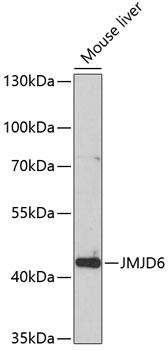
Western blot - JMJD6 Polyclonal Antibody
Western blot analysis of extracts of mouse liver, using JMJD6 antibody at 1:1000 dilution.Secondary antibody: HRP Goat Anti-Rabbit IgG (H+L) at 1:10000 dilution.Lysates/proteins: 25ug per lane.Blocking buffer: 3% nonfat dry milk in TBST.Detection: ECL Basic Kit .Exposure time: 90s.
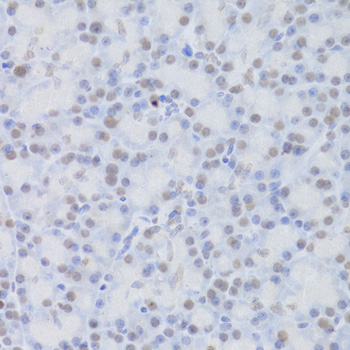
Immunohistochemistry - JMJD6 Polyclonal Antibody
Immunohistochemistry of paraffin-embedded mouse brain using JMJD6 Antibody at dilution of 1:200 (40x lens).
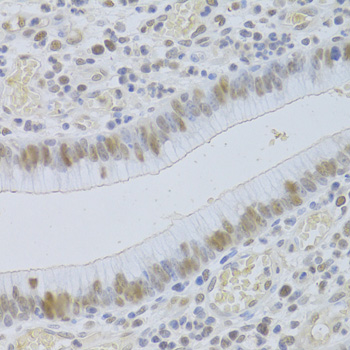
Immunohistochemistry - JMJD6 Polyclonal Antibody
Immunohistochemistry of paraffin-embedded rat pancreas using JMJD6 Antibody at dilution of 1:100 (40x lens).
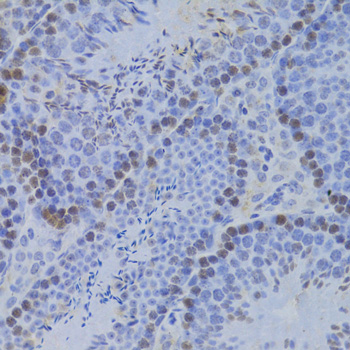
Immunohistochemistry - JMJD6 Polyclonal Antibody
Immunohistochemistry of paraffin-embedded human gastric cancer using JMJD6 Antibody at dilution of 1:100 (40x lens).
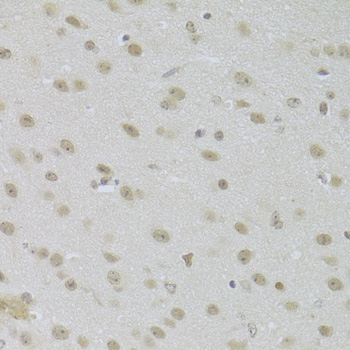
Immunohistochemistry - JMJD6 Polyclonal Antibody
Immunohistochemistry of paraffin-embedded mouse testis using JMJD6 Antibody at dilution of 1:100 (40x lens).
-
Background
Dioxygenase that can both act as a arginine demethylase and a lysyl-hydroxylase. Acts as a lysyl-hydroxylase that catalyzes 5-hydroxylation on specific lysine residues of target proteins such as U2AF2/U2AF65 and LUC7L2. Regulates RNA splicing by mediating 5-hydroxylation of U2AF2/U2AF65, affecting the pre-mRNA splicing activity of U2AF2/U2AF65. Hydroxylates its own N-terminus, which is required for homooligomerization. In addition to peptidyl-lysine 5-dioxygenase activity, may act as an RNA hydroxylase, as suggested by its ability to bind single strand RNA. Also acts as an arginine demethylase which preferentially demethylates asymmetric dimethylation. Demethylates histone H3 at 'Arg-2' (H3R2me) and histone H4 at 'Arg-3' (H4R3me), including mono-, symmetric di- and asymmetric dimethylated forms, thereby playing a role in histone code. However, histone arginine demethylation may not constitute the primary activity in vivo. In collaboration with BRD4, interacts with the positive transcription elongation factor b (P-TEFb) complex in its active form to regulate polymerase II promoter-proximal pause release for transcriptional activation of a large cohort of genes. On distal enhancers, so called anti-pause enhancers, demethylates both histone H4R3me2 and the methyl cap of 7SKsnRNA leading to the dismissal of the 7SKsnRNA:HEXIM1 inhibitor complex. After removal of repressive marks, the complex BRD4:JMJD6 attract and retain the P-TEFb complex on chromatin, leading to its activation, promoter-proximal polymerase II pause release, and transcriptional activation. Demethylates other arginine methylated-proteins such as ESR1. Has no histone lysine demethylase activity. Required for differentiation of multiple organs during embryogenesis. Acts as a key regulator of hematopoietic differentiation: required for angiogenic sprouting by regulating the pre-mRNA splicing activity of U2AF2/U2AF65 (By similarity). Seems to be necessary for the regulation of macrophage cytokine responses.
Related Products / Services
Please note: All products are "FOR RESEARCH USE ONLY AND ARE NOT INTENDED FOR DIAGNOSTIC OR THERAPEUTIC USE"
